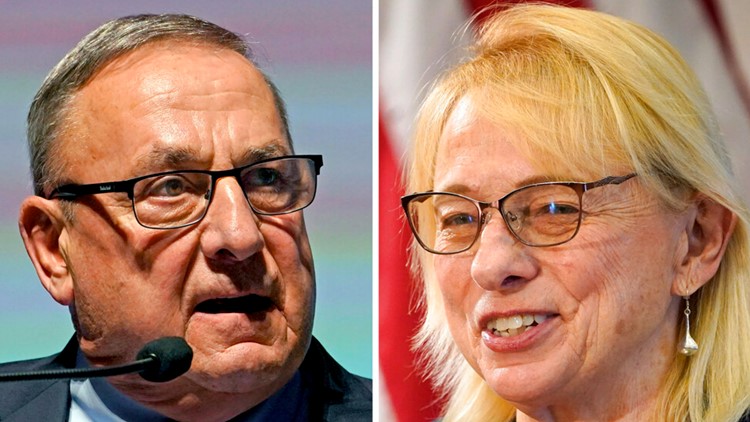AUGUSTA, Maine — As the economy took center stage in Maine’s gubernatorial race last week, attention focused on how the two major party candidates responded to very different economic challenges that took place during their terms in office.
The contrast emerged when former Gov. Paul LePage, a Republican, defended his economic record before the Portland Regional Chamber of Commerce on Thursday, noting he had increased Maine’s economic reserves despite a multitude of economic challenges when he came into office in 2011. He then said current Gov. Janet Mills was “very fortunate” that the COVID-19 pandemic came along — a crisis that led to an unheard-of influx in federal spending — to bolster revenues. The remark prompted a reportedly shocked look from his Democratic opponent.
“Because with COVID came nearly $15 billion from Uncle Joe, and that’s where the surplus comes from,” he said.
Mills later rebutted, saying her management allowed Maine to be in a place where it could recover from the pandemic despite tax revenue and public health cuts LePage had made.
“Maine has the funds to pay its bills and keep on top of its bills, revenues and expenses are aligned,” she said. “That’s pretty good governing, I think — it’s good management.”
Both moments underscored the tough economic times the candidates confronted in their first terms. They faced problems outside their control — for LePage, it was the lingering effects of the 2008 financial crisis holding down income and sales tax revenue on top of other inherited challenges. For Mills, her first year of policy victories in 2019 was overshadowed as the coronavirus pandemic swept through the state, temporarily devastating revenue projections before federal aid buoyed state and consumer spending.
With supply chain challenges, inflation and high fuel prices that have slightly abated from record heights reached this summer, the economy and how the leading candidates handled it will continue to be a central theme until November. We took a step back to examine the differences.
LePage, who served from 2011-19, took office three years after the Great Recession began. It was the longest economic downturn the country had faced since the Great Depression, and the recovery overall was painfully slow.
In the months prior to LePage taking office, the Consensus Economic Forecasting Commission noted the economic outlook was improving slowly. While Maine’s year-over-year economic activity had improved for the first time since April 2008, consumer sentiment was still down and personal incomes had yet to recover. The unemployment rate hovered around 8 percent in 2011, which brought down crucial income tax and sales tax revenue.
It was not until November 2014 that the forecasting commission reported a brighter economic situation — GDP output went up, as did personal income. Consumer sentiment increased nationally by 9.2 percent from the previous year.
The lingering economic hangover from the Great Recession caused numerous financial problems: Maine’s unfunded pension liability was growing as returns failed to meet expectations. The state budget faced a deficit, in part because it owed Medicaid money to hospitals.
When Mills came into office, the economic picture was rosier. The Consensus Economic Forecasting Commission in its 2019 report noted “cautious optimism” after 2018 posted good returns.
Even as the pandemic approached, the state’s financial picture still looked good in a March 2020 report detailing February 2020 revenues. But Kirsten Figueroa, the Department of Administrative and Financial Services commissioner, warned danger was just ahead.
“The breadth and depth of the impact of the coronavirus pandemic on the economy is changing so quickly that it’s impossible to project the full magnitude of the economic contraction and its length,” she wrote then.
By May, the economic collapse was in full swing: unemployment had tripled from March to April. In July 2020, Moody’s Analytics forecast a $1.4 billion revenue shortfall for Maine for the next three years.
The federal response to the 2008 financial crisis for states was, at the time, unprecedented. The American Recovery and Rescue Act of 2009 was an $831 billion stimulus package meant to plug revenue holes and help states recover, along with providing money for infrastructure projects. That included $1.4 billion to Maine.
But the Brookings Institution noted in a 2012 report that the federal relief did not keep up with the drop in state revenues across the country. That led local governments and other sectors to shed hundreds of jobs to cut costs. The recession coincided with a jump in Medicaid enrollments, unemployment insurance applications and higher education costs, causing budget gaps in most states.
The federal response to the pandemic, in contrast, was aggressive. Congress approved the $2.2 trillion Coronavirus Aid, Relief and Economic Security Act just months after states began shutting down businesses to in-person traffic and as COVID-19 cases began to rise rapidly across the country. Much of that money went to supporting businesses through loans and supporting states’ unemployment funds, boosting payments and ensuring many could support the spike in unemployment cases. It also provided $1,200 checks for adults making under $75,000.
Congress did not stop there, putting another $900 million into COVID-19 relief efforts, which included another $600 in checks in its December 2020 spending bill. Months later it approved the American Rescue Plan Act, which included $350 billion that went directly to states to be used to help the economy recover from the pandemic. Together the federal programs have pumped roughly $15 billion into the state within the last two years.
For Rep. Sawin Millett, R-Waterford, a former DAFS commissioner who served in Augusta during both candidates’ first terms, the difference between the responses was stark. The “one-time response” of the 2009 ARRA was not nearly on the magnitude of Congress’ COVID response, and that made a significant difference in how quickly the economies recovered.
But he noted both LePage and Mills had party majorities in Augusta when facing their economic crises, which allowed them to pass responsive policy easier. While he said the economy has turned around much quicker from the COVID-19 pandemic, he noted the continued outbreaks and hospitalizations still affect businesses’ ability to operate.
He also noted that state revenue forecasters’ prior confidences may change as the threat of a recession looms over the state. Those projections, expected at the end of the month, will give insight into whether a downturn is inevitable once the one-time revenues of federal aid are gone, he said.
LePage has built much of his economic policy on his desire to get rid of Maine’s income tax, saying this week it would help Maine get a competitive edge on building its workforce. It is a policy that builds on perhaps his most controversial move during his first year in office – the reduction of the state income tax from 8.5 to 7.5 percent.
The idea was to give more money back to Mainers, but getting rid of the income tax entirely has met resistance from fellow Republicans in the past. And the move had painful effects on the state’s revenues, something Garrett Martin, the president and CEO of the liberal-leaning Maine Center for Economic Policy, said hampered the state’s ability to recover from the recession in the long run.
That was compounded by LePage’s resistance to expanding Medicaid in the state, even after a people’s referendum required him to do so, and a budget where lawmakers did not include matching funds for low-income children’s health. That left behind nearly $2 billion in federal money the state could have used to help pay for lower-income health care needs while paying its bills, Martin said.
“He did nothing to actually counter what was happening in the economy more broadly,” he said.
Mills, in contrast, leveraged the federal money given to Maine after briefly reducing the budget when revenues looked poor. That included two sets of checks to Mainers, including a more expensive $850 version crafted this year after legislative Republicans called for her to return a budget surplus heavily supported by federal dollars. She has made those checks a central part of her campaign as well.
LePage has been consistently critical of the checks, saying Mills should have lowered the tax rate. Economists have believed stimulus efforts nationally could have contributed somewhat to inflation as well.
But some of the strongest critiques of the plan came from people within her party, who have said the money should have been used to help address housing shortages or rehabilitative bed wait times.
And not every conservative approved of the measure, either. Rep. Laurel Libby, R-Auburn, was one of a handful of Republicans to vote against the budget containing the checks, saying it should have been used to create a gas tax holiday and missed critical unmet needs in the state.
“This supplemental budget does fulfill a number of wish lists but fails to provide some very real and desperate needs in our state,” she said.
This story was originally published by The Maine Monitor. The Maine Monitor is a local journalism product published by The Maine Center for Public Interest Reporting, a nonpartisan and nonprofit civic news organization.



